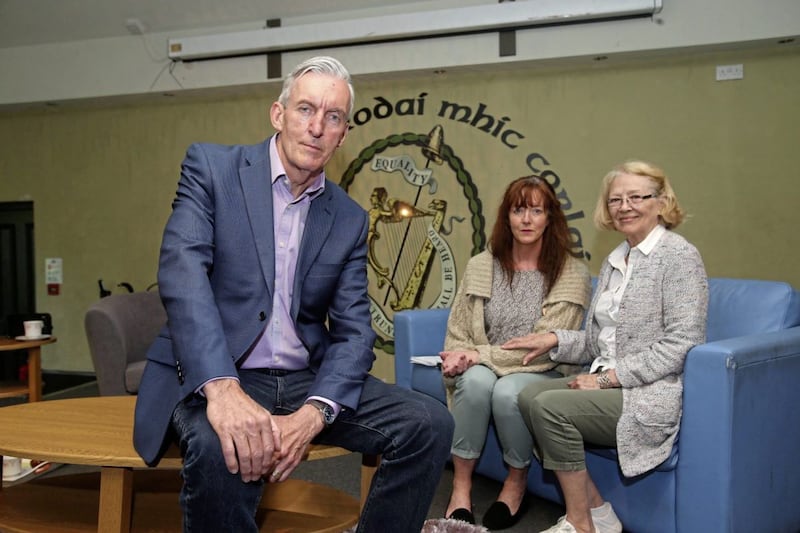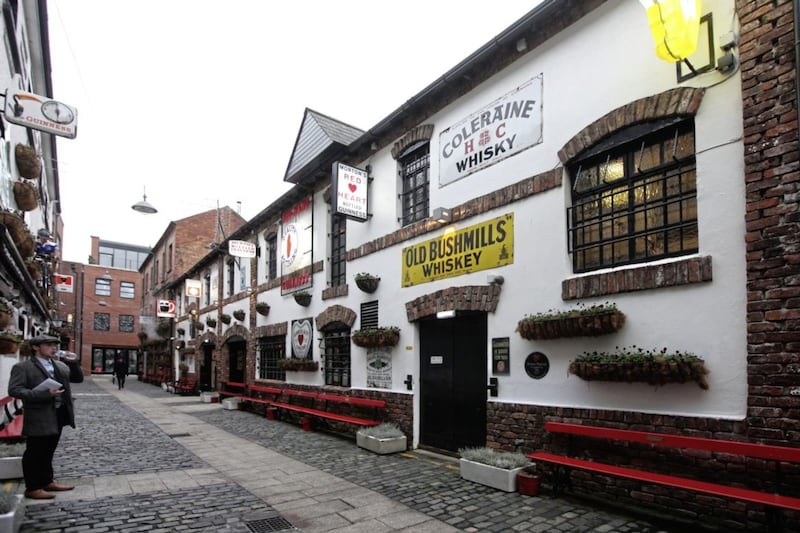WHEN Laurence McKeown came up with the idea of producing a special calendar to commemorate the 40th anniversary of the blanket protest at the Maze Prison, he wanted to show how the past can be transformed into something completely different, without detracting from the significance of the role history plays.
The former IRA hunger striker-turned writer and film-maker took an old H Block blanket, which had been lying in his attic, and had it cut and professionally fashioned into items of designer clothing to be worn by former blanket men and women.
Photographs were then taken of them wearing the new clothing and included in the commemorative We Wore The Blanket calendar.
The aim was to subvert the traditional image of the blanket protest – long hair and beards – to "give it a modern context", as McKeown says.
“People can look and tell it's the past but it's been taken and transformed. At the time I wanted the photographs to show how the situation has changed since then. But I also wanted to recall that period and how proud we were of the role we played in history.
“I can't escape the past; nor would I attempt to. We can't be imprisoned by the past, we can't be confined to it or defined by it. But we can challenge old fears by looking at them with a new eye. That's very much where I am now and it's much more liberating.”
Looking at historical events with a fresh eye is a theme which weaves its way through much of the work of the Randalstown-born playwright. His latest play, Something In The Air, will be staged in Belfast later this month by Brassneck Theatre Company and centres on the burning of Bombay Street by a loyalist mob 50 years ago this August.
Dundalk-based McKeown, whose previous works include Green and Blue, Those You Pass on the Street and In the Shadow of Gullion, uses the events of that night as the backdrop for the project. To escape the violence, families fled to refugee camps hastily set up in the Republic. In his fictional take on a factual moment in history, one of those refugees is 19-year-old Rosie Murphy. Now, 50 years on from that terrible night, Rosie is faced with her past in a way she could never have imagined.
“I like to bring things into the present, rather than focusing just on the past,” McKeown says. “It's a very human story, examining how the events of that night impact upon the character, the legacy of the past and what it means.
“I wanted the story to be centred on a young woman, someone who's fairly innocent. Things are quiet in this period, discrimination is ignored. People wake up, go to school, play in the street, watch workers head to Mackies. Then, within a matter of days, their understanding of the world has changed.”
The play's other lead character is also female, but from a very different background. Lauren is a social worker from the south and has never been to Belfast. Through her work with refugees she learns that many families fled their homes in Belfast in 1969 and begins her own voyage of discovery, which leads her to Rosie, 50 years on.
“A lot of things from her past are resurrected for Rosie,” McKeown says. “I suppose you could say her past comes back to haunt her. She has to confront things she's long buried.”
McKeown's own past has been well documented. Growing up in a mixed area, he was on good terms with his Protestant neighbours. His parents Margaret and George weren't political but were rather "Catholics who kept their heads down". He attended St Malachy's College in north Belfast but found it too regimented and took to "mitching off".
His first experience of discrimination as a young boy came and went without making much of an impact upon him at the time. His father was given plans for a bungalow build from a Protestant colleague but when he submitted them, the council turned down the application. It was also the first time he saw his father take a stand against bureaucracy when he challenged the decision. Only later, McKeown says, did he realise the significance of civil rights.
When he joined the IRA in 1973 at the age of 17, it wasn't because of any political ideology but a reaction to what he saw happening around him.
“The majority of people I met in jail didn't come from political families,” he says. “We were a new generation responding to what we saw going on in the streets. One big factor for me was the UDR, stopping us at checkpoints. These were guys we played football with and we were being asked who we were, where we coming from and where were we going.
"I remember one guy was embarrassed asking me what my name was but he soon got over that embarrassment and then aggression was involved. I realised then it wasn't about church or politics but power. One side had weapons and uniforms and the power to do whatever they wanted. For me, it was about injustice and inequality.”
In 1976 McKeown was arrested and charged with the attempted murder of an RUC officer and causing explosions. He was found guilty and sentenced to life imprisonment. While in the Maze he joined the blanket and dirty protests following the removal of Special Category Status for political prisoners.
He also took part in the IRA hunger strike, beginning his fast on June 29 1981. On the 70th day, his family intervened, his mum making the decision to authorise medical intervention to save his life. In October the hunger strike was called off; 10 prisoners had died.
Was he angry with his mum for intervening?
“No, not at all,” he says. “The families were in a terrible dilemma. They weren't IRA volunteers. They had seen one person die after another and no hope of our demands being met.
“Our families were suffering more on the outside and my mum had always stood by me throughout my life, when I was on the run, in jail. There was no way I was going to be angry with her.”
He recalls waking up in the intensive care ward of the Royal Victoria Hospital, a 6ft 2 man, weighing seven stone.
“I knew I was alive," he says. "I wasn't happy or sad, just alive and exhausted. It was a strange place to be in.
"I'm glad I did it, though. Looking back over my life there are a few things I'd do differently, but not to do with the conflict. I was right to make the decision to go on hunger strike.”
While in prison, McKeown did an Open University degree in sociology. He also began to develop a love of writing. Following his release in 1992 he gained a doctorate from Queen's. As well as writing several books on republicans prisoners in the Maze, he co-wrote a number of plays before debuting his first solo play, The Official Version in 2006.
His daughters, Orlaith (20) and Caoilfhionn (22), have, he says, a "totally different consciousness" to that which he had as a young man.
While acknowledging that lessons still need to be learned about dealing with demands around issues of inequality, these are "small in comparison" to what has been achieved.
“The population has changed. The confidence of the Catholic/nationalist community has grown,” he says. “Thankfully my girls would never think of themselves as second-class citizens. It's just not in their heads at all – and that's the beauty of change.”
:: Something In The Air, the MAC, Belfast, May 28-June 9.





